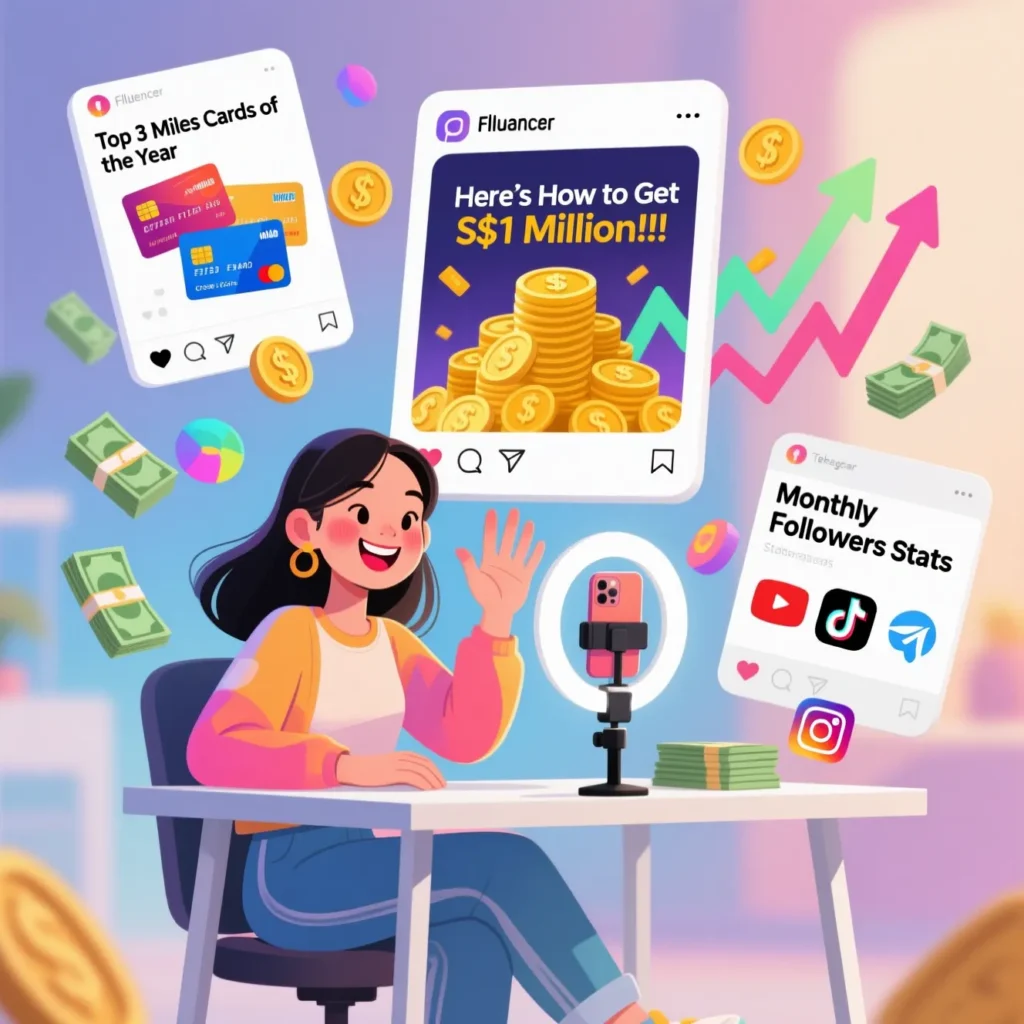Money advice has never been louder—or more confusing. On one side are finfluencers vs financial advisors, battling for your trust and attention. These finance influencers vs advisors flood TikTok, YouTube, and Instagram with quick-hit investing tips, while financial influencers vs experts in traditional offices promise security through certified guidance. But in a world where digital voices compete with professional counsel, the real question becomes: who deserves your confidence when it comes to your hard-earned money?
Meanwhile, the stakes couldn’t be higher. Choosing between money influencers vs advisors isn’t just about convenience—it’s about credibility, risk, and accountability. In contrast, licensed professionals face regulations, while investing influencers vs advisors thrive on relatability. Ultimately, the decision demands scrutiny, strategy, and a balance between digital influence and professional expertise.
🤑 Investment Advice from Finfluencers vs. Professionals: What You Need to Know
The Money Advice Dilemma

Welcome to the money advice dilemma—basically the financial version of “Do I text my ex or not?” 💔 On one side, you’ve got finfluencers vs financial advisors battling like it’s a WWE match. Meanwhile, TikTok finfluencers are promising to turn $50 into a yacht 🛥️, while certified planners are quietly saying, “Um… maybe start with a budget?” 📊
Moreover, it’s not just about who’s cooler. Finance influencers vs advisors come with different vibes: finfluencers give you hype and memes 🎉, while financial influencers vs experts deliver spreadsheets and compliance forms 📑. Therefore, the dilemma is real—do you want entertainment or accountability? Ultimately, the answer might just be a mix of both (like pineapple on pizza 🍍🍕—controversial, but workable).
🤑 Check out how social media is reshaping money talk
The explosion of money talk online
The explosion of money talk online is basically like a caffeine-fueled reality show—everyone’s suddenly a “finance expert” with a ring light 💡. Meanwhile, nearly 77% of Gen Z and 65% of millennials admit they scroll TikTok and Instagram for financial tips instead of textbooks. Moreover, the advice swings from smart budgeting hacks to “buy crypto now and thank me later.” 🚀
Here’s how the money talk stacks up:
Table: Who’s Watching Finfluencers? Generational Trends, Money Tips, and the Hidden Risks
| Who’s Watching 💻 | What They’re Getting 📊 | The Risk ⚠️ |
|---|---|---|
| Gen Z (77%) | Viral investing hacks | IRS trouble 🧾 |
| Millennials (65%) | Side hustle tips | Burnout 😵 |
| Everyone else | Budget memes | False confidence 💸 |
Therefore, free advice can be golden—or a glitter-coated trap. Ultimately, it’s entertaining, but your wallet deserves fact-checking too.
🤑 See how social media money tips can make or break your finances in this Credit Karma study.
Why the battle between finfluencers and advisors matters
The finfluencers vs financial advisors showdown isn’t just about likes, memes, or who’s rocking the better blazer 👔 vs hoodie 👕. Meanwhile, it’s a real fight for your trust—and your wallet. Finfluencers pump out quick-hit tips with viral energy ⚡, while financial influencers vs experts quietly build long-term strategies that don’t fit neatly into a 30-second reel.
Moreover, this battle matters because advice can make—or break—your money goals. Finfluencers offer accessibility and hype 🎉, but without regulation, their advice can be riskier than YOLO’ing into meme stocks 🚀. Advisors, by contrast, may feel pricier and less trendy, but ultimately they bring accountability, personalization, and a safety net when things go south.
🤑 Discover why flashy financial content doesn’t always equal smart money moves
The stakes: trust, credibility, and your financial future
When it comes to money, the stakes are higher than a Vegas poker table 🎰. The finfluencers vs financial advisors debate isn’t just noise—it’s about whether you’re building real wealth or accidentally funding someone else’s influencer lifestyle. Meanwhile, flashy posts promise quick wins, but one wrong move could send your savings into the abyss 🕳️.
Here’s what’s really on the line:
Trust 🤝 – Do you believe the advice is genuine, or just sponsored content in disguise?
Credibility 📜 – Finance influencers vs advisors vary wildly: one thrives on clicks, the other is bound by rules.
Accountability ⚖️ – Financial influencers vs experts face regulations; TikTok advisors, not so much.
Your Future 🚀 – Ultimately, the choice decides whether your financial goals soar—or stall.
Finfluencers: The Rise of Digital Finance Voices

Who exactly are finfluencers?
So, who are these mysterious money messiahs? The term “finfluencer” is short for financial influencer—basically, anyone with a ring light 💡, a TikTok account, and enough confidence to say “buy this stock” while dancing to trending audio 🎶. Meanwhile, the rise of finfluencers vs financial advisors has made finance feel less like Wall Street and more like addictive Netflix content.
They pump out quick videos about saving, investing, side hustles, or crypto, often wrapped in flashy edits and viral hooks 🚀. Their appeal is obvious: they’re relatable, funny, and ditch the intimidating jargon. Moreover, they speak in memes, not in spreadsheets. But here’s the catch: unlike financial influencers vs experts, most lack credentials, accountability, or regulation. Ultimately, finfluencers are great at sparking curiosity—but they shouldn’t be your one-stop financial strategy.
💬 “Finfluencers make money fun—but fun doesn’t equal financially safe.”
🤑 Learn how finfluencers are shaping money culture (and the risks behind the hype)
The appeal of quick, relatable money tips
Why are millions hooked on finfluencers vs financial advisors content? Simple: it’s quick, snackable, and wrapped in humor. Meanwhile, a 30-second TikTok about saving $500 with a latte hack feels way more fun than a 30-page PDF from a financial influencer vs expert. Add memes, trending audio, and flashy text overlays—and suddenly personal finance looks less like homework and more like a Netflix marathon 📱🍿.
Moreover, relatability is the secret sauce. When you see someone just like you paying off debt, building an emergency fund, or bragging about side hustles, it feels doable. Advisors may have degrees, but finfluencers have vibes—and vibes spread faster. Ultimately, that’s why their content goes viral, even if accuracy sometimes lags.
Table: Why People Love Finfluencers: Benefits, Risks, and the Viral Money Advice Effect
| Why People Love It ❤️ | What They Get 📱 | What They Risk ⚠️ |
|---|---|---|
| Fast, fun money hacks | Motivation & relatability | Oversimplified or wrong advice |
| Viral success stories | Entertainment + inspiration | Unrealistic expectations |
🤑 See why quick-hit financial content is dominating feeds
Viral success stories—and cautionary tales
The internet loves a good glow-up story 💡—and finfluencers vs financial advisors have plenty to deliver. Meanwhile, viral posts of people paying off $100k in debt, building six-figure portfolios, or ditching their 9-to-5s for side hustles spread like wildfire. These finance influencers vs advisors inspire millions by showing that financial progress isn’t just for the elite.
Moreover, not all stories end with confetti 🎉. For every success, there’s someone who followed a risky meme-stock 🚀, jumped on a shady crypto coin 💀, or trusted “tax hacks” that invited the IRS to their doorstep. Ultimately, viral doesn’t always equal valid.
Some highlights and lowlights:
Paying off massive debt ✅
Building investment portfolios 📈
Inspiring financial literacy 💬
Losing savings on risky tips 💸
Falling for scammy side hustles ❌
🤑 Read how viral finance advice shapes behavior—for better or worse
The blurred line between content and advice
Ever notice how a “friendly tip” from a finfluencer suddenly ends with, “Use my code to sign up today!”? 👀 That’s the blurred line between content and advice. Meanwhile, the battle of finfluencers vs financial advisors gets especially messy here: one side sells entertainment, the other sells accountability.
Moreover, financial posts often look like genuine guidance—but they’re frequently sponsored, biased, or just plain trendy. Ultimately, what feels like free wisdom might actually be a sales pitch in disguise.
Q: Why does this matter?
A: Because advice without accountability is like a parachute without straps—looks good, but won’t save you. 🪂
Financial Advisors: The Traditional Guardians of Wealth

Defining the role of a licensed advisor
So, what exactly does a licensed financial advisor do? Unlike the chaotic world of TikTok money hacks, advisors come with credentials, rules, and accountability. Meanwhile, in the showdown of finfluencers vs financial advisors, this is where the pros pull ahead.
A licensed advisor is:
✅ Certified by regulatory bodies (think exams, licenses, and lots of compliance paperwork 📑)
✅ Skilled at creating personalized financial roadmaps covering investments, retirement, taxes, and estate planning
✅ Legally obligated to put your best interests first, unlike financial influencers vs experts who may prioritize clicks
Ultimately, the defining feature is trust. Advisors bring long-term stability, while finfluencers ride the algorithm wave 🌊.
🤑 Learn more about what real financial planners do
The benefits of regulation and professional standards
Money might not come with a rulebook, but financial advisors sure do. Meanwhile, in the battle of finfluencers vs financial advisors, regulation is the secret weapon that separates licensed pros from viral hype machines.
Here’s how they compare:
Table: Financial Advisors vs Finfluencers: Key Benefits, Gaps, and Accountability Differences
| What Advisors Bring ✅ | What Finfluencers Lack ❌ |
|---|---|
| Accountability – legally bound to act in your best interest 🤝 | No fiduciary duty, no guarantees |
| Transparency – fees, risks, and strategies must be disclosed 📑 | Hidden sponsorships, vague captions |
| Credibility – certifications, exams, ongoing education 🎓 | No training, just algorithms |
| Protection – recourse if advice goes wrong ⚖️ | Zero safety net if it fails |
Ultimately, professional standards give advisors a level of trust that influencers can’t replicate—because hashtags don’t equal safeguards.
🤑 Discover why regulation protects your money
Where financial advisors still fall short
Sure, financial advisors bring regulation, accountability, and impressive certifications. Meanwhile, in the debate of finfluencers vs financial advisors, it’s important to admit that even the pros aren’t flawless.
Advisors can be expensive 💸, with fees that quietly eat away at returns. Moreover, some face conflicts of interest—recommending products that benefit them more than you. Others may stick to old-school strategies that feel out of touch compared to the relatable, meme-filled world of financial influencers vs experts.
Ultimately, while advisors deliver expertise and structure, they’re not immune to bias, high costs, or outdated thinking. The lesson? Just because someone is licensed doesn’t mean they’re the right fit for you. Asking tough questions and comparing options is key.
🤑 See why even traditional advisors deserve scrutiny
From protecting clients during market crashes to mishandling risk, financial advisors’ track records are mixed—but at least traceable.
Trust, Risk, and Accountability in Money Matters

The psychology of trust in financial advice
When it comes to money, trust isn’t logical—it’s emotional. Meanwhile, the clash of finfluencers vs financial advisors proves that vibes often beat credentials. Why do people follow a TikTok advisor with zero licenses instead of a certified expert with decades of training? Blame our brains 🧠.
Relatability over expertise – We trust people who “feel like us,” even if their advice is oversimplified.
Confidence bias – Loud, charismatic finfluencers sound convincing, and confidence often gets mistaken for competence.
Authority shortcuts – A suit, a mic, or a viral platform can trick us into assuming credibility.
Ultimately – Trust is less about spreadsheets and more about storytelling, relatability, and repetition.
That’s why financial influencers vs experts compete on two very different fronts: one sells connection, the other sells accountability.
🤑 Learn how psychology shapes financial trust
Comparing transparency: influencers vs advisors
When it comes to honesty, the finfluencers vs financial advisors battle is like comparing reality TV to a courtroom drama 🎥⚖️. Meanwhile, one side thrives on filters and flashy captions, while the other operates under regulations and fine print.
Here’s the transparency breakdown:
Table: Transparency Showdown: Financial Advisors vs Influencers in Disclosure, Oversight, and Accountability
| Advisors ✅ | Influencers ❌ |
|---|---|
| Must disclose fees, risks, and obligations 📑 | Often hide sponsorships behind “friendly tips” 💰 |
| Regulated by law, held accountable ⚖️ | No oversight—just algorithms and ad revenue 📲 |
| Provide written contracts and compliance trails ✍️ | Deliver one-size-fits-all advice with no guarantees 🎭 |
Ultimately, financial influencers vs experts differ most in accountability. Advisors might be boring, but at least they’re required to tell you the truth—TikTok doesn’t have a “compliance department.”
🤑 Explore how transparency makes or breaks financial advice
A “get rich quick” scheme promoted by an influencer could wipe out a follower’s savings—without consequence for the influencer.
Accountability—who pays when advice goes wrong?
Here’s the harsh truth: when financial advice goes sideways, someone always pays. The big difference in the finfluencers vs financial advisors debate is who that is. Meanwhile, advisors and influencers operate on completely different accountability planets 🌍.
Financial Advisors ✅ – They’re legally bound by fiduciary duty. If they give bad advice, there’s a paper trail, regulations, and sometimes even financial restitution. You can file a complaint, call a regulator, or sue if things get ugly. ⚖️
Finfluencers ❌ – If their “hot stock tip” tanks your savings, good luck chasing them down. No fiduciary duty, no oversight, no refunds—just a deleted video and maybe a half-hearted “sorry, fam” on Instagram. 💸
Ultimately, financial influencers vs experts differ most here: advisors are held accountable, while influencers walk away untouched.
How to Choose the Right Path for Your Wallet

Questions to ask a financial advisor
Choosing between finfluencers vs financial advisors is tricky—but if you’re leaning toward the pros, you’ve got to play detective 🕵️. Meanwhile, don’t just nod politely in meetings—come armed with questions. Think of it like speed dating, but instead of finding love, you’re finding someone to protect your retirement fund. 💸
Here’s your must-ask lineup:
“How do you get paid?” 💰 – Commission, flat fee, or percentage of assets? Transparency matters.
“Are you a fiduciary?” ⚖️ – This is code for: will you put my interests first, or your own?
“What’s your investment philosophy?” 📊 – If it sounds like TikTok hype, run.
“How will you customize advice for me?” 🎯 – Cookie-cutter plans won’t cut it.
Ultimately, the right questions reveal whether you’re hiring a trusted guide—or just another salesperson.
🤑 Get more tips on choosing the right advisor
Red flags when following finfluencers
Sure, scrolling through finfluencers vs financial advisors content can feel like free money school—but not all advice deserves your trust. Meanwhile, the influencer world is filled with 🚩 warning signs that scream “don’t bet your savings on this.”
Watch for these red flags:
🚩 Guaranteed returns – If they promise you’ll “double your money fast,” run. Legit finance comes with risk.
🚩 Luxury flexing – Lambos, private jets, and “retire by 25” vibes are usually marketing, not mentoring.
🚩 Affiliate links everywhere – When every “tip” ends with “use my code,” it’s more sales pitch than strategy.
🚩 No credentials – Unlike financial influencers vs experts, most finfluencers aren’t regulated or licensed.
🚩 Fear or hype tactics – “Buy now before it’s too late!” is not financial planning—it’s clickbait.
🤑 Learn how to spot shady influencer advice
You don’t have to pick a side. Advisors can provide long-term strategy while finfluencers spark curiosity and motivate learning.
Building your own financial literacy toolkit
Depending solely on finfluencers vs financial advisors is like eating only fast food or only kale—you’ll survive, but you won’t thrive 🍔🥬. Meanwhile, the smartest money move is creating your own financial literacy toolkit. That means knowing enough to spot hype, understand the basics, and ask smarter questions—whether you’re scrolling TikTok tips or sitting across from a certified advisor.
Moreover, your toolkit isn’t just apps and books. It’s the mindset of curiosity and skepticism combined. Ultimately, the more financially fluent you are, the less likely you’ll fall for quick fixes or overpay for “expert” advice.
💬 “Financial literacy is the only investment that guarantees lifelong returns.”
🤑 Build a stronger money foundation with resources
Long-term vs short-term guidance strategies
The real divide between finfluencers vs financial advisors often comes down to one word: time. Meanwhile, finfluencers thrive on quick hits—“save $500 this month,” “buy this trending stock,” or “side hustle your way to riches” 🚀. It’s flashy, fast, and sometimes fun—but not always sustainable.
Moreover, advisors play the long game. They’re mapping out retirement, estate planning, and strategies that stretch decades into the future. Their approach might feel slower and less exciting, but ultimately, it’s designed to weather storms, not just chase trends.
Think of it this way: finfluencers are like sprint coaches, giving you bursts of energy 🏃, while advisors are marathon trainers, pacing you for the finish line 🏅. Both can be useful, but mixing the two wisely is what builds true financial strength.
Conclusion: The Future of Financial Advice
Finding balance between human expertise and digital influence
The tug-of-war between finfluencers vs financial advisors doesn’t need a single winner. Meanwhile, the smartest strategy might be blending both worlds—using digital content for inspiration and professional advisors for accountability.
Moreover, finfluencers are great at sparking curiosity, simplifying complex ideas, and making finance feel approachable. On the flip side, financial influencers vs experts who are licensed bring structure, personalization, and guardrails that TikTok can’t provide. Ultimately, it’s not about choosing one camp but knowing when to listen to each.
Think of it like cooking: finfluencers give you the recipe hacks 🍳, but advisors help you stock the pantry for life. Put the two together, and you’ve got a financial kitchen that actually works.
🤑 Sharpen your financial edge—check out what’s new on Investillect.


